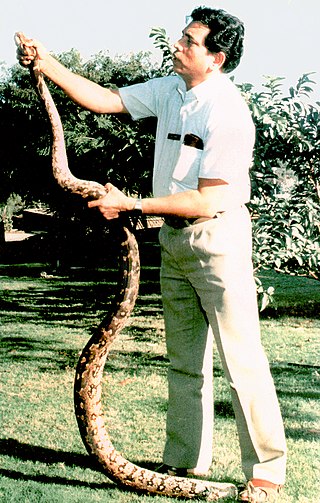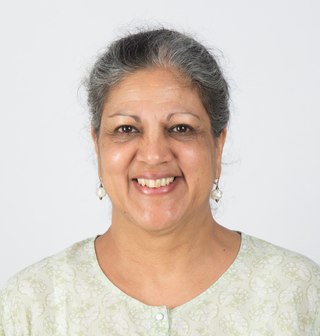
Genome Valley is an Indian high-technology business district spread across 2,000-acre (8.1 km2)/(3.1 sq mi) in Hyderabad, India. It is located across the suburbs, Turakapally, Shamirpet, Medchal, Uppal, Patancheru, Jeedimetla, Gachibowli and Keesara. The Genome Valley has developed as a cluster for Biomedical research, training and manufacturing. Genome Valley is now into its Phase III, which is about 11 kms from the Phase I and II with the total area approximately 2,000-acre (8.1 km2).

The Centre for Cellular and Molecular Biology or CCMB is an Indian fundamental life science research establishment located in Hyderabad that operates under the aegis of the Council of Scientific and Industrial Research. CCMB is a designated "Centre of Excellence" by the Global Molecular and Cell Biology Network, UNESCO.
Samir Kumar Brahmachari is an Indian biophysicist and Former Director General of the Council of Scientific & Industrial Research (CSIR) and Former Secretary, Department of Scientific and Industrial Research (DSIR), Government of India. He is the Founder Director of Institute of Genomics and Integrative Biology (IGIB), New Delhi and the Chief Mentor of Open Source for Drug Discovery (OSDD) Project. He is the recipient of J.C Bose Fellowship Award, DST (2012). In addition, he is one of the featured researchers in the India Cancer Research Database developed by Institute of Bioinformatics (IOB), Bangalore with support from the Department of Biotechnology, Government of India.

Manchanahalli Rangaswamy Satyanarayana Rao known by the abbreviation M. R. S. Rao, is an Indian scientist. He has been awarded the fourth highest civilian award Padma Shri in Science and Engineering category by the Government of India. He was the President of Jawaharlal Nehru Centre for Advanced Scientific Research (JNCASR) in Bangalore, India (2003-2013).

Garikapati Narahari Sastry is an Indian chemist. He has taken charge as Director of CSIR-North East Institute of Science and Technology, Jorhat, Assam on 19 February 2019. After taking charge as the Director, he has worked towards converting knowledge in the areas of computational modelling and Artificial intelligence from basic to translational research, by working closely with society and industry. Ultimately, revitalizing the strength of science and technology is essential in achieving the self-reliant and strong India. In the era of Industry 4.0 and 5.0, combining our traditional wisdom with modern science appear to be indispensable in the sectors such as Education, Health, Agriculture, Industrial and Societal development at large. Prior to joining as the Director, he headed the Molecular Modelling Division at the CSIR Indian Institute of Chemical Technology in Hyderabad, India. Sastry has made pioneering contributions in the areas of computational chemistry and computational biology.
Ch. Mohan Rao is an Indian molecular biologist. He holds a Ph.D. in chemistry from the University of Hyderabad. He was a visiting associate at the National Institutes of Health, US, during 1990–92. He was a visiting professor at the Tokyo Science University, Japan during 1996. Visiting Scientist, UTMB, Galveston, USA, Visiting Professor, Protein Research Institute, Osaka, Japan. Adjunct Professor, RMIT University, Melbourne, Australia. He was positioned as director for the Centre for Cellular and Molecular Biology in Hyderabad, India. He is CSIR-Distinguished Scientist and Sir JC Bose National Fellow at CCMB He was awarded in 1999 the Shanti Swarup Bhatnagar Prize for Science and Technology, the highest science award in India, in the Medical Sciences category.
Pushpa Mittra Bhargava was an Indian scientist, writer, and administrator. He founded the Centre for Cellular and Molecular Biology, a federally funded research institute, in Hyderabad. He was outspoken and highly influential in the development of scientific temper in India, and argued that scientific rationalism needed to be cultivated as a civic duty.
Dr. Vinod Scaria FRSB, FRSPH is an Indian biologist, medical researcher pioneering in Precision Medicine and Clinical Genomics in India. He is best known for sequencing the first Indian genome. He was also instrumental in the sequencing of The first Sri Lankan Genome, analysis of the first Malaysian Genome sequencing and analysis of the Wild-type strain of Zebrafish and the IndiGen programme on Genomics for Public Health in India

Sunil Kumar Verma, was an Indian biologist and a principal scientist at the Centre for Cellular and Molecular Biology, Hyderabad, India. Verma was primarily known for his contributions to the development of "universal primer technology", a first generation DNA barcoding method, that can identify any bird, fish, reptile or mammal from a small biological sample, and satisfy legal evidence requirements in a court of law. This technology has revitalised the field of wildlife forensics and is now routinely used across India to provide a species identification service in cases of wildlife crime. This approach of species identification is now known as "DNA barcoding" across the world.

Lalji Singh FNA, FASc was an Indian scientist who worked in the field of DNA fingerprinting technology in India, where he was popularly known as the "Father of Indian DNA fingerprinting". Singh also worked in the areas of molecular basis of sex determination, wildlife conservation forensics and evolution and migration of humans. In 2004, he received the Padma Shri in recognition of his contribution to Indian science and technology.

Dipankar Chatterji is an Indian molecular biologist and the Honorary Professor at Molecular Biophysics Unit, Indian Institute of Science, a multidisciplinary research institute under the Department of Science and Technology of the Government of India. He is known for his pioneering research on bacterial transcription. He is a recipient of Shanti Swarup Bhatnagar Prize and is an elected fellow of all the major Indian science academies. The Government of India awarded him the fourth highest civilian honour of the Padma Shri, in 2016, for his contributions to science and engineering.
Sushil Kumar was an Indian geneticist and academic, known for his Plant and microbial genetical genomics, especially the studies on Escherichia coli and Lambda phage as well as on the mutants of Rhizobium. He was a former director of the Central Institute of Medicinal and Aromatic Plants of the Council of Scientific and Industrial Research and an elected fellow of the Indian National Science Academy, National Academy of Agricultural Sciences, National Academy of Sciences, India, and Indian Academy of Sciences. The Council of Scientific and Industrial Research, the apex agency of the Government of India for scientific research, awarded him the Shanti Swarup Bhatnagar Prize for Science and Technology, one of the highest Indian science awards, in 1981, for his contributions to biological sciences.
Kalappa Muniyappa is an Indian molecular biologist and geneticist, known for his researches on the chromatization of DNA and gene targeting. He is a professor and chairman of the department of biochemistry of the Indian Institute of Science and an elected fellow of the Indian National Science Academy, Indian Academy of Sciences and the National Academy of Sciences, India. The Council of Scientific and Industrial Research, the apex agency of the Government of India for scientific research, awarded him the Shanti Swarup Bhatnagar Prize for Science and Technology, one of the highest Indian science awards, in 1995, for his contributions to biological sciences.
Ghanshyam Swarup is an Indian molecular biologist, a J. C. Bose National Fellow and the head of the Ghanshyam Swarup Research Group of the Centre for Cellular and Molecular Biology. He is known for his studies on glaucoma and the discovery of protein tyrosine phosphatase, a new protein influencing the regulation of cell proliferation. Swarup is an elected fellow of the Indian Academy of Sciences, the Indian National Science Academy and the National Academy of Sciences, India. The Council of Scientific and Industrial Research, the apex agency of the Government of India for scientific research, awarded him the Shanti Swarup Bhatnagar Prize for Science and Technology, one of the highest Indian science awards, in 1996, for his contributions to biological sciences.
Tapas Kumar Kundu is an Indian molecular biologist, academician and at present the Director of Central Drug Research Institute, a prestigious research institute of Council of Scientific and Industrial Research at Lucknow. He is the head of the Transcription and Disease Laboratory of Jawaharlal Nehru Centre for Advanced Scientific Research. He is known for his studies on the regulation of Gene expression and his contributions in cancer diagnostics and the development of new drug candidates for cancer and AIDS therapeutics. He is an elected fellow of the Indian Academy of Sciences, Indian National Science Academy and the National Academy of Sciences, India and a J. C. Bose National Fellow of the Department of Science and Technology. The Council of Scientific and Industrial Research, the apex agency of the Government of India for scientific research, awarded him the Shanti Swarup Bhatnagar Prize for Science and Technology, one of the highest Indian science awards, in 2005, for his contributions to biological sciences. He is also a recipient of the National Bioscience Award for Career Development of the Department of Biotechnology.
Vinod Bhakuni (1962–2011) was an Indian molecular biophysicist and the head of the Molecular and Structural Biology Division of the Central Drug Research Institute (CDRI). He was the founder of the Protein Chemistry laboratory of CDRI and was known for his contributions to the study of protein folding. A recipient of the National Bioscience Award for Career Development, he was an elected fellow of the Indian Academy of Sciences, Indian National Science Academy and the National Academy of Sciences, India. The Council of Scientific and Industrial Research, the apex agency of the Government of India for scientific research, awarded him the Shanti Swarup Bhatnagar Prize for Science and Technology, one of the highest Indian science awards, in 2006, for his contributions to biological sciences.
Vinod Kumar Gaur is an Indian seismologist,a former director of the National Geophysical Research Institute and an honorary emeritus scientist at CSIR Fourth Paradigm Institute, known for his prediction of the April 2015 Nepal earthquake. He is reported to have conducted extensive studies on the tectonics of the Himalayas and is an elected fellow of the National Academy of Sciences, India, The World Academy of Sciences, Indian Academy of Sciences and the Indian National Science Academy. The Council of Scientific and Industrial Research, the apex agency of the Government of India for scientific research, awarded him the Shanti Swarup Bhatnagar Prize for Science and Technology, one of the highest Indian science awards for his contributions to Earth, Atmosphere, Ocean and Planetary Sciences in 1979.
Trilochan Mohapatra is an Indian biotechnologist, geneticist, a government secretary of the Department of Agricultural Research and Education (DARE) and the director general of the Indian Council of Agricultural Research. Known for his studies in the fields of molecular genetics and genomics, Mohapatra is an elected fellow of the National Academy of Sciences, India, the National Academy of Agricultural Sciences, the Indian National Science Academy and the Indian Society of Genetics and Plant Breeding. The Department of Biotechnology of the Government of India awarded him the National Bioscience Award for Career Development, one of the highest Indian science awards, for his contributions to biosciences in 2003.
Subhadeep Chatterjee is an Indian molecular biologist and a scientist at the Centre for DNA Fingerprinting and Diagnostics (CDFD). A member of Guha Research Conference, he is known for his studies on plant-microbe interactions and heads the Lab of Plant-Microbe Interactions at CDFD where he hosts several researchers.

Jyotsna Dhawan is an Indian Cell and Developmental Biologist, Emeritus Scientist at Centre for Cellular and Molecular Biology and Visiting Professor, Institute for Stem Cell Science and Regenerative Medicine (inStem). Dhawan's research has focused on adult stem cell function and skeletal muscle regeneration. Dhawan is the current (2019-2021) President of the Indian Society for Cell Biology and the Indian Society of Developmental Biologists (2017-2020). Dhawan was elected as a fellow to the Indian National Science Academy in 2019.








